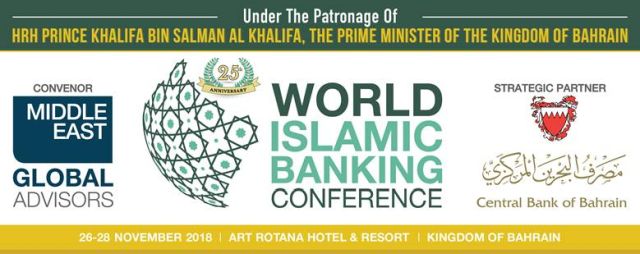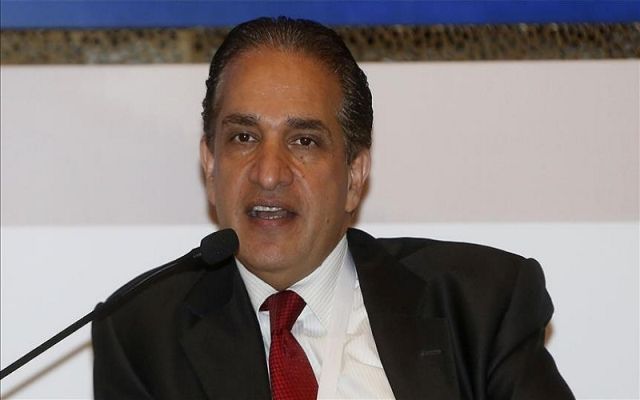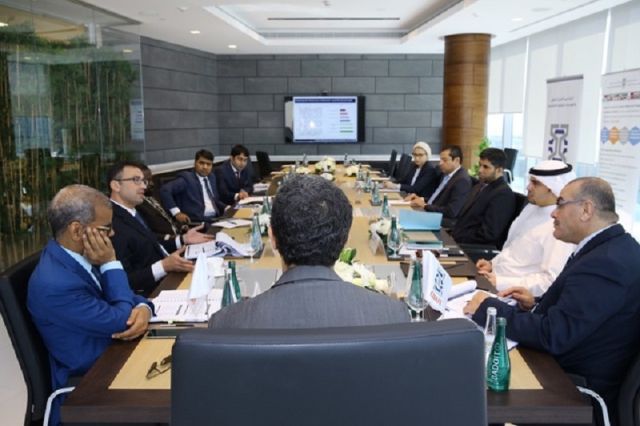
by admin | May 25, 2021 | Islamic Banking, Islamic Finance, Muslim World, News
 By Maeeshat News,
By Maeeshat News,
Top performing Islamic Financial Institutions from Bahrain, Egypt, Indonesia, Jordan, Kuwait, Malaysia, Oman, Pakistan, Turkey, UAE and Saudi Arabia are vying for the WIBC Awards recognizing the Best Performing Banks at the Global and Regional level.
Manama, Kingdom of Bahrain: A testament to its vision of advancing the global Islamic banking industry, the 25th World Islamic Banking Conference (WIBC) will continue in its endeavor of enhancing the performance and quality of key Islamic financial institutions by means of the 4th WIBC Leaderboard.
Held under the patronage of HRH Prince Khalifa Bin Salman Al Khalifa, The Prime Minister of the Kingdom of Bahrain and with the strategic partnership of the Central Bank of Bahrain, the World Islamic Banking Conference (WIBC) will take place on November 26th, 27th & 28th at the ART Rotana Hotel in Amwaj Islands, Kingdom of Bahrain. A key highlight of the three-day forum will be the annually anticipated WIBC Performance Awards 2018, whereby industry leaders will be recognized for their excellence at the Gala Dinner on November 27, and the nominees of which have been already announced and can be viewed at: https://wibc2018.com/awards
Introduced in 2015 and forming the basis of the annual WIBC Performance Awards is the WIBC Leaderboard: a first-of-its-kind comprehensive assessment tool aimed at helping the Islamic finance industry to critically appraise the challenges and growth opportunities that lie ahead.
The WIBC Leaderboard ranks Islamic banks as compared to their key competitors at the global and regional levels, based on various robust financial and governance metrics. These metrics comprise: Financial Stability (Total Capital and Tier 1 Capital Ratios, Loan-Loss Reserves (LLR) to Gross Loans Ratio, Loan-Loss Reserves (LLR) to Non-Performing Loans (NPL) Ratio, Non-Performing Loans (NPL) to Gross Loans); Financial Performance (Return on Average Assets (ROAA), Return on Average Equity (ROAE), Cost-to-Income Ratio (CIR), Assets Growth) and Governance and Social Responsibility (Financial Disclosure Index, CSR Disclosure).
In addition to the individual metrics, banks will be ranked on the basis of an aggregate score, which forms the apex of the WIBC Leaderboard. This aggregate index holistically ranks entities on the basis of the aforementioned financial and governance measures. The data employed in creating the assessment framework has been sourced from the ICD Thomson Reuters Islamic Finance Development Indicator (IFDI) and Orbis Bank Focus.
Top performing Islamic financial institutions will be vying for 2 categories of the awards: One Global Award and Three Regional Awards for each of the following world regions: GCC, Asia and Levant. Currently, top performing Islamic banks vying for the Global Award include: Kuwait Finance House (Kuwait); Al Rajhi Bank (Saudi Arabia); Jordan Islamic Bank (Jordan); Kuwait International Bank (Kuwait); Boubyan Bank (Kuwait); Ahli United Bank (Kuwait); Warba Bank (Kuwait); PT Bank Syariah BNI (Indonesia), Maybank Islamic Berhad (Malaysia) & Dubai Islamic Bank (UAE).

Introduced as part of the 2nd WIBC Leaderboard, The Governance & CSR Award (Corporate Social Responsibility) will be a key award constituting this year’s WIBC Performance Awards, the scores of which will be aggregated as per the CSR Index and the Islamic Finance Development Indicator (IFDI). The Governance and Social Responsibility variables are extracted from the Thomson Reuters database. The innovative 25th edition will also see an Award for the Fastest Growing Bank (in terms of asset growth) to recognize an Islamic financial institution that has expanded rapidly over the last year.
Confirmed partners at The 25th WIBC so far include: Casablanca Finance City Authority, Ithmaar Bank, Khaleeji Commercial Bank (KHCB), World Gold Council, Bank ABC, Bank of Khartoum-International, First Energy Bank, Bahrain Islamic Bank (BisB), DWF, Al Baraka Banking Group, Thomson Reuters, Path Solutions, Moody’s Investor Service, Emerico, The Perth Mint, WTS Dhruva Consultants, Baker McKenzie, Eiger Trading, Department for International Trade – British Embassy Bahrain, DDCAP, Fitch Ratings, Sadad & GPS.
The theme for the 25th WIBC – “Islamic Finance & Sustainable Economic Growth in the Age of Disruption” is in line with the conference’s steady vision to serve as a compass for the global Islamic finance and banking industry, with the three-day forum expected to draw participation from over 1300 global industry leaders, policy makers, innovators and stakeholders, all focused on generating breakthrough insights that help navigate through the complexities of the global financial system.

by admin | May 25, 2021 | Islamic Banking, Islamic Finance, Muslim World, News

Group chairman and chief executive officer of Path Solutions, Mohammad Kateeb.
Ankara : Turkey plays a leading role in Islamic finance, said group chairman and chief executive officer of Path Solutions, an Islamic banking software provider.
“I believe that Turkey has a role to play as a leader in Islamic finance and as a hub because it is one of the top three Islamic finance markets in the world,” Mohammad Kateeb told Anadolu Agency (AA).
He spoke on the sidelines of the General Council for Islamic Banks and Financial Institutions (CIBAFI) Global Forum in Istanbul which took place recently.
The two-day forum, which ended on Thursday with Anadolu Agency as its global communication partner, focused on how the industry will fulfill its obligations while remaining competitive and relevant within global financial markets.
Kateeb said they are interested in Turkey because they believe that the Turkish market is “very advanced” in technology.
Also addressing Path Solution’s commitment in contributing to the empowerment of the Islamic finance industry, Kateeb said development of blockchain technology that records and verifies transactions safely based on cryptography — is significant for Islamic finance.
“We believe that the development of blockchain is very important for Islamic finance because blockchain allows you to track value securely and transparently and allows you to also exchange documentations like contracts, in a secure way,” he added.
Kateeb said security and transparency are “very important” for Islamic finance since it is based on assets.
“I believe blockchain will remove the middleman from a lot of transactions,” he added.
—SM/UNA-OIC

by admin | May 25, 2021 | Islamic Finance, News

American University
Washington : American University is now offering a graduate certificate in Islamic finance to better prepare professionals to compete and do business in both emerging and established markets.
The curriculum includes courses that focus on the role of Islamic finance in the global economy and Islamic capital markets. Coursework also focuses on Sukuk (Islamic bonds), which are structured to generate returns without generating interest, which is prohibited in Islam.
For Ghiyath Naqshbandi, an executive in residence at American University’s Kogod School of Business in the US, the graduate certificate in Islamic finance is a dream now realized. Naqshbandi created the certificate as part of his larger vision of advancing Islamic finance. The United States is run by a very different kind of financial model, he said while noting that the American University is one of the only institutions in the country to offer a program.
“I am trying to establish a legacy,” Naqshbandi said. Coursework includes more than book learning. Naqshbandi regularly brings in experts to speak to classes. Speakers who visit and Skype in include CEOs, lawyers and high-profile Islamic finance professionals from Kuwait, and Bahrain, among other countries, News Wise reported.
“There are lots of opportunities for employment,” he continued. “It’s a new field and untapped field in the United States. We’ve been out of the loop for more than 15 years. London, Paris, Singapore, Shanghai and other countries have been taking the lead. It’s about time for us to capture some of the markets.”
Naqshbandi does not want finance professionals to be deterred by the “Islamic” in Islamic finance. Students enrolled in the certificate program come from a variety of backgrounds and religious traditions. Ultimately, he says, the program will help redefine the way professionals do business.
“Islamic finance is for humanity. It means socially responsible business, partnerships between entrepreneurs and financial institutions focusing on real markets. That means productive capacities to produce things that have a real impact on people’s lives.”
American University is a leader in global education, enrolling a diverse student body from throughout the United States and nearly 140 countries. Located in Washington, D.C., the university provides opportunities for academic excellence, public service, and internships in the nation’s capital and around the world.
The Kogod School of Business is the leading destination for the study of business in the Washington, D.C. metro area. The School has been a part of the D.C. business community for 60 years and is accredited by the Association to Advance Collegiate Schools of Business. AACSB accreditation represents the highest standard of achievement for a business school worldwide. Kogod’s Washington, D.C. location serves as a laboratory for learning through work, internships, and other forms of experiential education.
—SM/OIC-UNA

by admin | May 25, 2021 | Muslim World
 Manama : Aligned with its role as advocate of the Islamic Financial Services Industry (IFSI), the General Council for Islamic Banks and Financial Institutions (CIBAFI), the global umbrella of Islamic financial institutions, announced that it has submitted its comments on Tuesday to the Basel Committee on Banking Supervision (BCBS) on the Consultative Document on “Sound Practices: Implications of fintech developments for banks and bank supervisors.”
Manama : Aligned with its role as advocate of the Islamic Financial Services Industry (IFSI), the General Council for Islamic Banks and Financial Institutions (CIBAFI), the global umbrella of Islamic financial institutions, announced that it has submitted its comments on Tuesday to the Basel Committee on Banking Supervision (BCBS) on the Consultative Document on “Sound Practices: Implications of fintech developments for banks and bank supervisors.”
The Consultative Document has been issued on 31st August 2017 and was open for public consultation until 31st October 2017.
CIBAFI thanked the BCBS for giving the opportunity to the Islamic Financial Services Industry to comment on the Consultative Document. CIBAFI has provided collective feedback of its member banks from over 32 jurisdictions, comprising the following key points.
First, the Consultative Document sets out five scenarios for the way the banking industry may change, ranging from one in which existing banks adopt new technology to improve their services (but customer relationships remain essentially unchanged), to one in which banks become essentially irrelevant, as customers interact directly with individual financial services providers. CIBAFI believes that, while major banks in the most developed countries may be able to adapt to most of these scenarios, and will have themselves a role in determining which will occur, this is less obvious for smaller banks in less developed countries. Most Islamic banks are of this kind, and there are indeed challenges in the way they need to adapt their knowledge and resources for such changes. Further support from bank supervisors would be welcome.
Second, the BCBS implicitly recognizes that fintech firms may have a greater impact in some markets than others. The suggestion is that in less developed banking markets, and mainly where financial inclusion is relatively low, new entrants may be able to use technology to reach consumers who have no, or limited, existing banking relationships. However, although many Islamic banks operate in less developed and low financial inclusion markets, for Islamic banking, in particular, the threat of new entrants is smaller due to the Shariah compliance requirements. It is thus an opportunity for Islamic banks to collaborate with fintech firms to enhance financial inclusion.
Third, the CD lays emphasis on the need to maintain Anti-Money Laundering and Countering the Financing of Terrorism (AML/CFT) controls in fintech-enabled transactions, though it recognizes the assistance that some new technologies, including artificial intelligence, may offer.
In conclusion, CIBAFI highlighted that its members have pointed out that more comprehensive researches might be needed to assess the macro level effect of fintech, the impact on the economy, financial stability, and the way the central banks may still influence the economy via the monetary and other policies. There may also be tax issues, including whether tax regimes provide incentives or disincentives for fintech firms. CIBAFI recognizes, therefore, need to highlight the importance of such work to the attention of those who do have competence in these areas.
In addition to policy and regulatory advocacy, CIBAFI continues to support the Islamic Financial Services Industry through various activities and initiatives. These include providing industry stakeholders with a platform to discuss emerging issues, representing the industry at major global financial events, and sharing knowledge through specialized publications and comprehensive training programmes.
CIBAFI is an international organization established in 2001 and Headquartered in the Kingdom of Bahrain. CIBAFI is affiliated with the Organization of Islamic Cooperation (OIC). CIBAFI represents the Islamic financial services industry globally, defending and promoting its role, consolidating co-operation among its members, and with other institutions with similar interests and objectives. With over 120 members from 32 jurisdictions, representing market players, international intergovernmental organizations and professional firms, and industry associations.
—SM/OIC-UNA

by admin | May 25, 2021 | Muslim World
 Manama : The 24th edition of World Islamic Banking Conference (WIBC), the world’s longest running Islamic banking conference, is set to return to Bahrain this December for three days, and will take stock of the most pressing issues affecting the global financial landscape.
Manama : The 24th edition of World Islamic Banking Conference (WIBC), the world’s longest running Islamic banking conference, is set to return to Bahrain this December for three days, and will take stock of the most pressing issues affecting the global financial landscape.
Middle East Global Advisors, a leading financial intelligence platform facilitating the development of knowledge-based economies in the MENASEA markets, announced that the largest and most prestigious gathering of Islamic banking and finance leaders in the world will be held from December 4 to 6 at the ART Rotana Hotel in Amwaj Islands, Bahrain, TradeArabia News Service reported.
The theme for WIBC 2017 – Drivers of Economic Growth & Risks: Policymakers & Regulators is in line with the conference’s steady vision to serve as a compass for the global Islamic finance and banking industry, and is expected to draw participation from over 1,300 global industry leaders, policymakers, innovators, and stakeholders, all focused on generating breakthrough insights that help navigate through the complexities of the global financial system, a statement said.
Ehsan Abbas, chairman, Middle East Global Advisors, said: “This year’s event will take place within the context of increasing global political and economic turbulence particularly the growing skepticism against the banking and finance industry attributed to the Global Financial Crisis of 2008-09. Over the years, this skepticism shaped into displeasure towards “the establishment” incumbents in the government, official and private sectors, a sentiment that was echoed in the recent Edelman Trust Barometer.”
Khalid Hamad Abdul-Rahman Hamad, executive director Banking Supervision, Central Bank of Bahrain, said: “The Central Bank of Bahrain takes great pride in supporting the 24th World Islamic Banking Conference. WIBC has a track record of presenting topical issues every year. Some of the key topics this year will be the moral question in finance, the impact of Fintech and new trends in Shariah governance. The deceleration in the growth of Islamic finance worldwide continued tightening of regulations and Fintech provide a significant opportunity to the most efficient and technology savvy players to gain market share at the expense of their less efficient conventional and Shariah-compliant competitors.
“The WIBC will witness a gathering of global subject matter experts who will help the audience understand the dynamics of an industry in transition. It will also provide an excellent networking opportunity to individuals and a platform for companies to exhibit their services,” he said.
Key features for WIBC 2017 include: Governors’ Addresses; High-profile Regulatory Debate among Central Bankers; a conversation with a distinguished Islamic finance veteran – Adnan Ahmed Yousif, chief executive and president, Al Baraka Banking Group on the future course of the Islamic economy, a CIO-focused panel session on harnessing digital technologies with the vision of staying relevant; Panel discussions focusing on dynamic capital markets, sustainable, equitable & inclusive growth, new horizons for Islamic finance, ESG Investing and the influence of energy prices, VAT, the effect of the recent global economic & political developments and much more.
Committed to its vision to innovate year-on-year, the 24th edition will focus on generating thought-leadership via an exclusive WIBC Knowledge-Sharing Series whereby a select group of industry leaders will make focused presentations/speeches that will be followed by opening the floor to questions from the audience and a select panel of experts, who will be further discussing these key topics at length. The exclusive series will touch upon a number of topical issues like Leveraging Islamic Capital Markets for innovative solutions that will focus on Aviation Financing, Alternative/Renewable Energy Financing and the WIBC Islamic Economy Series concentrate on developing a halal ecosystem, amongst others, the statement said.
Industry leaders will also be recognized for their excellence through the WIBC Performance Awards 2017.
—OIC-UNA/IINA






